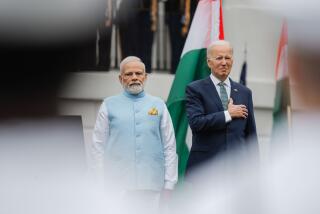Pakistan’s Moderation
- Share via
Since seizing power in a bloodless coup more than two years ago, Pakistani President Pervez Musharraf has been leading his nation out of the camp of Islamic extremism. He speeded up the process in a speech after Sept. 11, announcing a break with the Taliban and warning that Pakistan’s survival would be jeopardized if it opposed the United States. Last Saturday, with Pakistan on a war footing in its conflict with neighboring India, he moved a step further and pledged to crack down on Islamic radicals.
Both of the televised speeches were courageous, and their favorable reception by most Pakistanis should be an inspiration to moderate Muslims. U.S. Secretary of State Colin L. Powell, who leaves today for a trip that includes Pakistan and India, called Musharraf’s latest address “bold and principled.”
Musharraf castigated those who seek to “propagate their own brand of religion” and banned several groups thought to engage in terror at home and abroad. His government has arrested hundreds more members of banned groups.
Musharraf’s remarks in large part were aimed at India, at defusing the renewed crisis over control of the Indian state of Kashmir, on the India-Pakistan border.
India welcomed the address but rightly demanded action as well. The key will be Pakistan’s dealings with the border guerrillas that it considers fighters for freedom of the disputed territory. India considers them terrorists. If Pakistan ensures that the fighters do not cross from the part of Kashmir it controls into Indian-held territory, New Delhi should be willing to hold talks.
India mobilized its million-member army and moved hundreds of thousands of troops to the border with Pakistan after five terrorists attacked the Parliament building in New Delhi Dec. 13. Nine Indians and the five attackers were killed. India said the assailants belonged to two Pakistani groups that have carried out similar raids. Pakistan banned both organizations but has refused to turn over other men whom India has blamed for earlier acts of terror.
Although pro-Taliban demonstrations were smaller than feared and the president’s two speeches were generally well received, Pakistan still has a sizable number of Islamic radicals. This forces Musharraf to move carefully.
Pakistan and India, separated in 1947 when both became independent from Britain, have fought three wars, two centered on Kashmir. Now both of the nuclear-armed nations would benefit from outside help to get peace talks started.
That’s where Powell can come in, offering help and reassuring both countries of the U.S. desire for good relations. Pakistan and India need U.S. friendship and assistance. They can continue to earn it by defusing tensions on the border.
More to Read
Sign up for Essential California
The most important California stories and recommendations in your inbox every morning.
You may occasionally receive promotional content from the Los Angeles Times.













